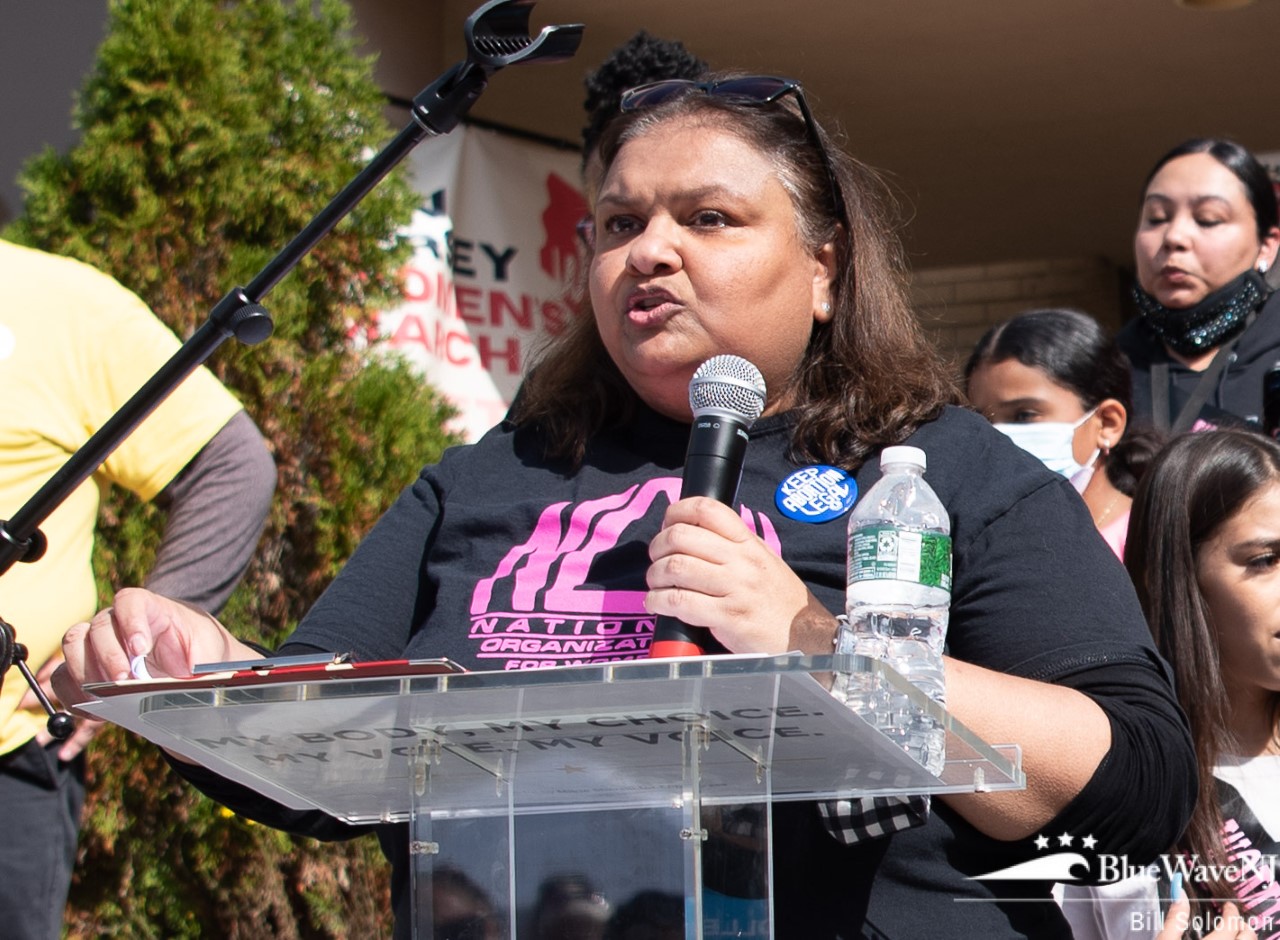
Nine months after the state leaders of the National Organization for Women of New Jersey resigned over racism and ageism allegations, a grievance committee directed all 2,200 leaders and members of the feminist advocacy group statewide to undergo anti-discrimination and anti-bullying training.
The three-member panel, appointed by national NOW officials, declared the “hostility” of communications by local chapter leaders with those who resigned as “toxic” and “dismaying.”
“The local officers should have been mindful of the long history of undermining leadership of and micro-aggressive behavior towards persons of color in membership organizations and couched their conduct with this history in mind,” the committee wrote in an 8-page decision issued last month.
Training “will sensitize all parties and members to the feelings of persons of color and young persons whose active participation in the feminist community must be encouraged,” the panel added.
The committee stopped short of booting the offending officials from the organization or banning them from leadership positions, as the former state leaders had urged, because they didn’t find their actions “egregious” enough to do so. The local officers named in the grievance largely are older white women and men.
Many of the former state leaders found it “disappointing but not surprising” that the current leaders have been permitted to remain.
“All of us definitely feel that there is a lack of will and a lack of courage, frankly, for change at NOW,” said Anjali Mehrotra, the group’s state president from January 2019 until she resigned in November. “In 1990, it was OK to send somebody to sensitivity training. But at this point, there has to be something more than that. There has to be actual accountability.”
She added: “This is how racism is allowed to flourish in progressive and feminist circles, driving out women of color.”
Katie Brennan, the state chapter’s former treasurer, was among those who filed a grievance.
“It’s disappointing to leave NOW. But if things like this can’t be taken seriously and there’s the same old tired tendencies to cave to legacy members, I don’t think that this is where we’re going to be fruitful in our efforts for gender equity,” Brennan said.
A national NOW spokeswoman declined to comment.
Jill Anne LaZare was a leader of the Union County chapter who became acting president of the state chapter after Mehrotra resigned.
She told the New Jersey Monitor the allegations of racism and ageism were “absolutely unfounded.” The anti-bullying and anti-discrimination training ordered is “routine” and a “prudent” way for everyone to move forward, she added. She said the arbiters found no bias, accused the New Jersey Monitor of failing to read the decision “objectively,” and added: “if you want to make it bad for everyone, everywhere, you can do so, you’re the journalist.”
“What they really did was they bunted in this decision. They tried not to find any real fault on either side, but to try to accommodate both sides,” LaZare said. “Now, if you read something that’s incendiary because you read it that way, I want you to know that it will be making it harder for all of us to move forward.”
Long-simmering power struggle
The dispute dates back more than five years, stemming from a power struggle between the organization’s eight regionally based local chapters and the eight leaders of its state chapter.
The state leaders wanted to amend the bylaws to allow each local chapter to elect one member to the state board, instead of three as bylaws now allow. They argued that the current setup gives the local chapters outsized influence on the state board by stacking it with 24 locally elected members compared to just eight state leaders.
Some local leaders balked at the proposed change, and as the organization prepared for a statewide conference set for last September, communications between the state and local leaders deteriorated. One local leader called Mehrotra “a tyrant. A dictator. The censor-in-chief,” while he and others accused state leaders of censorship, “self-promotion,” and using “victim language,” emails show.
Older local leaders complained about younger members who “didn’t want to do the work” and were “always online,” according to Brennan. These complaints created an exclusionary culture that drove some interns and younger members to quit, Brennan said.
“To say that young people are not doing the work is, one, not factually true, but also disrespectful,” she said.
After the former state leaders resigned last September in protest, leaders of five chapters held an election to pick acting state officers — excluding three local chapters, including the only two led by Black women, according to the former state leaders.
This is how racism is allowed to flourish in progressive and feminist circles, driving out women of color.
– Anjali Mehrotra, former president of the National Organization for Women of New Jersey
In November, Mehrotra, Brennan, and two other state leaders who had resigned filed grievances against 21 leaders of the South Jersey, Shore Area, and Northern New Jersey chapters and county-based chapters in Middlesex, Morris, and Union counties.
They urged national leaders to adopt a zero tolerance policy for bullying, harassment, and name-calling and asked that the local leaders be held accountable for creating a toxic work environment, especially for young women and women of color.
A month later, 19 local leaders responded with grievances of their own against the former state leaders, accusing them of purposely resigning en masse to paralyze the organization and thereafter blocking access to the state chapter’s bank accounts and records.
The grievance panel, while noting the allegations on both sides were “problematic,” largely rejected the arguments.
The bylaws don’t restrict state officers’ right to resign nor require them to explain their reasons, the panel wrote. And the lack of guidance from national NOW officials “mitigates the seriousness” of the former state leaders’ refusal to relinquish control of the state chapter’s accounts and records, they added.
The grievance panel wrote that the local leaders said they did not intend to be racist or ageist, and “mere disagreement” in democratically run organizations is not bullying.
“The committee cannot read the minds of the parties in order to adduce their true feelings,” the panel wrote, in declining to condemn their actions or restrict their roles or membership in the organization.
The panel directed the organization to hold a new election for state leaders under its guidance and convene a state conference within 30 days to decide whether to amend the bylaws. LaZare said an election has been tentatively scheduled but declined to tell the New Jersey Monitor when.
Terry O’Neill is the former national president of NOW. During her tenure as president from 2009 to 2017, NOW updated its mission statement to include intersectional grassroots feminist activism, which means centering marginalized women in its work for equal rights.
She called the decision “atrocious” because the panel considered only the intent of the local leaders and not the impact of their behavior — and in doing so, failed to hold them accountable for their wrongdoing. To be truly inclusive and anti-racist, you must center the person who was harmed and repair the harm to make the harmed person whole, she added.
“None of that happened in this decision,” O’Neill said. “A decision was made that there was bullying, racist bullying, and that there would be, as I call it, a ‘no-consequence consequence,’ which is like two hours of training. And my problem with a no-consequence consequence is that the people who were wronged have been excluded, their pain has been ignored, they have been erased, and that is completely at odds with the fundamental values that the national organization is supposed to stand for.”
‘First step to change’
Mehrotra remains a member of NOW’s national board, at least until her current term expires in one more year. She’s not sure she’ll stay on after that, because she’s concerned about entrenched “gatekeeping” that excludes women of color and young people.
“They are encouraging those people to join because they want to show that they’re diverse, but they don’t really want to relinquish control to the same people. They don’t really afford them a voice. It’s more about tokenism,” she said.
That’s not a new problem in feminist and progressive advocacy groups, she added.
“That’s one of the reasons we filed the grievance,” she said. “We could have just quietly resigned and let them go on and not call it out. But shining a light on what’s happening is a first step to change. Even though we didn’t get the result we wanted here, the only way we will see change is to show what’s going on.”
GET THE MORNING HEADLINES DELIVERED TO YOUR INBOX
SUPPORT NEWS YOU TRUST.




